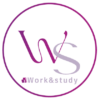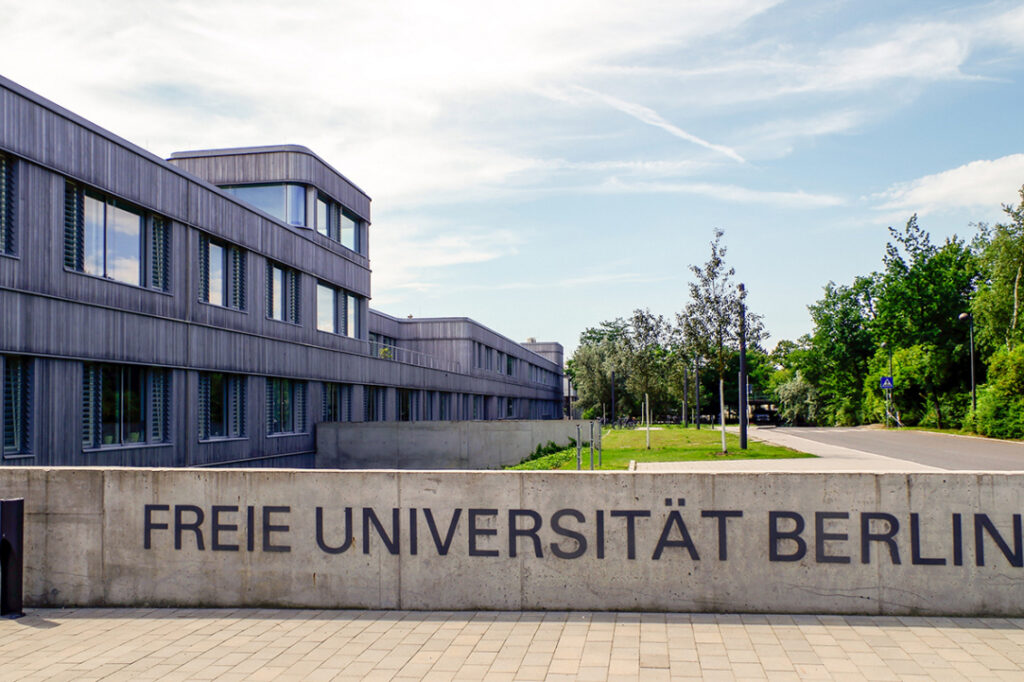The main features of Freie Universität’s research activities include the broad variety of global academic and scientific cooperation arrangements in place as part of alliance projects and networks with other entities active in research, alongside the university’s innovative support concepts for junior scholars and scientists and the scope of the external funding the university raises.
The various areas of focus in the research conducted at Freie Universität are organized into various structures, including interdisciplinary focus areas, excellence clusters, collaborative research centers, and research centers.
Freie Universität is a full-spectrum university, comprising twelve departments and three Central Institutes that together offer more than 150 different academic programs in a broad range of disciplines. Charité – Universitätsmedizin Berlin is the joint medical school of Freie Universität Berlin and Humboldt-Universität zu Berlin.
Dahlem Research School (DRS) at Freie Universität Berlin offers the framework encompassing a range of outstanding structured doctoral programs. By establishing the DRS, Freie Universität Berlin broke new ground in the field of graduate education in Germany, all with the aim of offering junior scholars and scientists the best possible conditions for their academic development. At the DRS, strategies to support doctoral candidates and postdoctoral students at Freie Universität are developed, research within interdisciplinary and international alliances is fostered, and established graduate schools and research training groups receive support alongside new initiatives.
International Alignment
Freie Universität owes its founding, in 1948, to international support, and international impulses have shaped the university’s research activities and student life ever since. As an International Network University, Freie Universität thrives on its many contacts with higher education institutions and organizations in Germany and abroad, which provide critical impetus for the university’s research and teaching activities.
Today, Freie niversität maintains roughly 100 partnerships at the university-wide level, along with about 330 university partnerships within the Erasmus academic exchange network and ca. 45 institute partnerships, forming a wide-ranging and tight-knit global network.
Each year, about 600 international scholars and scientists contribute to the variety of teaching and research activities pursued at Freie Universität. One groundbreaking development that demonstrates the way the university takes international cooperation to the next level is the five international liaison offices of Freie Universität that were founded beginning in 2007 – in Beijing, Cairo, Moscow, New Delhi, and São Paulo. Another is the establishment of special arrangements with selected universities in the form of strategic partnerships.
Freie Universität Berlin is a full university with 16 departments and central institutes offering over 150 degree programs across a wide range of subjects.
Academic Departments
- Department of Biology, Chemistry, and Pharmacy
- Department of Earth Sciences
- Department of Education and Psychology
- Department of History and Cultural Studies
- Department of Law
- Department of Mathematics and Computer Science
- Department of Philosophy and Humanities
- Department of Physics
- Department of Political and Social Sciences
- Department of Veterinary Medicine
- School of Business and Economics
- Medical School – Charité – University Medicine Berlin
Central Institutes
- Institute for East European Studies
- Institute for Latin American Studies
- John F. Kennedy Institute for North American Studies
- Dahlem School of Education
Graduate Schools and Graduate Programs
- Berlin-Brandenburg School for Regenerative Therapies
- Berlin Graduate School Muslim Cultures and Societies
- Berlin Mathematical School
- Friedrich Schlegel Graduate School of Literary Studies
- Graduate School of East Asian Studies
- Graduate School of North American Studies
Interdisciplinary Centers and Excellence Clusters
Bachelor and Master’s Programs taught in English at Freie Universität and Master’s Programs taught in English offered jointly by several Universities (including Freie Universität)
Courses in these programs are taught entirely in English. Consequently, admission does not require proof of German skills. Application documents do not always have to be directed to Freie Universität. Application modalities can be found in the course description on the respective web pages.
Bachelor
Master
- Biochemistry (Master of Science)
- Bioinformatics (Master of Science)
- Chemistry (Master of Science)
- China-Europe Executive Master of Business Marketing (MBM)
- Computational Sciences (Master of Science)
- Data Science (Master of Science)
- English Studies: Literature, Language, Culture (Master of Arts)
- European and International Business, Competition and Regulatory Law (Master of Business Law)
- Global History (Master of Arts)
- Interdisciplinary Studies of the Middle East (Master ot Arts)
- International Health (Master of Science)
- Iranian Studies (Master of Arts)
- Mathematics (Master of Science)
- Medical Neurosciences (Master of Science)
- Modern Greek Language and Literature (Master of Arts)
- Molecular Medicine (Master of Science)
- North American Studies (Master of Arts)
- Pharmaceutical Research (Master of Science)
- Physics (Master of Science)
- Polymer Science (Master of Science)
- Social, Cognitive and Affective Neuroscience (Master of Science)
- Sociology – European Societies (Master of Arts)
- Visual and Media Anthropology (Master of Arts)
German Skills for Studying and Applying at Freie Universität Berlin
German language skills on a high level are an essential precondition for studying. Proof of German proficiency must be received by uni-assist as an officially certified copy by the end of the application deadline.
Only if you participate in an exchange program, if you wish to enroll in a study program taught in English or if you have an appropriate approval from the doctoral committee in charge for your doctoral project, then you do not need German language skills.
Due to the current situation, it is sufficient to submit simple copies of proofs of language skills for application or enrollment for the winter semester 2020/21.
Enrollment (Immatrikulation)
For enrollment you have to prove German language skills by submitting one of the certificates listed below. The certificates must not be older than three years.
Enrollment in the bachelor degree program Deutsche Philologie (all course components) as well as in the master’s degree program Deutschsprachige Literatur (both majors):
- TestDaF with level 5 in all four parts
- DSH 3
Enrollment in other degree programs:
- DSH 2
- Telc C 1-Hochschule
- C 2-Zertifikat des Goethe-Instituts
- Deutsches Sprachdiplom der Kultusministerkonferenz – Zweite Stufe (DSD II)
- Feststellungsprüfung des Studienkollegs (Assessment Exam of the Studienkolleg)
- TestDaF with at least level 4 in all four parts
If you cannot submit any of the above-mentioned certificates when applying, you will be invited to take the German Language Examination – DSH (Deutsche Sprachprüfung für den Hochschulzugang) at Freie Universität in case of admission. Detailed information about the DSH is available on the website of the Language Center of Freie Universität Berlin (in German only).
Application
When applying for a degree program at Freie Universitaet Berlin you have to prove at least German proficiency at level C1 CEFR by submitting one of the following certificates:
- C1 CEFR certificate with grades
- TestDaF registration (only for wintersemester 2020/2021)
- TestDaF with at least level 4 in two parts and level 3 in two parts (f.e. 4/4/3/3)
- language evaluation test, which attests skills at level C1 CEFR
- DSH 1
Proof of German language skills must be received by uni-assist as an officially certified copy by the end of the application deadline.
German Skills for the Studienkolleg
In general, it is advisable to submit a proof of German language skills at level C1, as only the evaluation of the university entrance qualification (HZB) will determine whether you have to attend the Studienkolleg or can apply for a degree program directly.
However, if you are sure that you have not obtained a direct HZB with your certificate from your home country and you need to attend the Studienkolleg, German proficiency at level B2 is sufficient.
For level B2 CEFR the following proofs are accepted:
- DSH-1
- TestDaF registration (only for wintersemester 2020/2021)
- TestDaF with at least level 3 in all four parts
- B2 CEFR certificate with grades from a language school
- language evaluation test, which attests skills at level B2 CEFR
- proof of attendance for C1 language course (ongoing or completed course)
Proof of German language skills must be received by uni-assist as an officially certified copy by the end of the application deadline.
Learning German
The Language Center of Freie Universität Berlin offers pre-semester and summer classes at an advanced level. To prepare for the TestDaF or DSH German classes can be taken at the Goethe-Institut, at private language schools in Germany, or in the student’s home country. The DAAD offers information about summer language courses in Germany.
Fees & Funding
Except for some graduate or postgraduate programs, the Freie Universität Berlin does not charge tuition fees; students are merely responsible for paying certain fees and charges each semester.These fees and contributions are subject to change.
Your living costs mainly depend, of course, on your personal requirements and habits. You should count on spending a minimum of 600 to 700 Euro (rental fees, grocery, leisure time etc.). In order to obtain an entry visa or a residence permit for study purposes, you must prove that this monthly amount is at your disposal, independent of any job.
Degree program students with a residence permit for study purposes are allowed to work for a maximum of 90 days (or 180 half days) per year. Jobs as a student tutor at the university do not count.
Students receiving grants are not allowed to work.
Entry & Residence
It is best to carefully plan your stay as a student well before you travel to Berlin. Formalities with regard to enrollment, residence permits, visa, etc. can be handled more quickly if you bring along all the required documents

